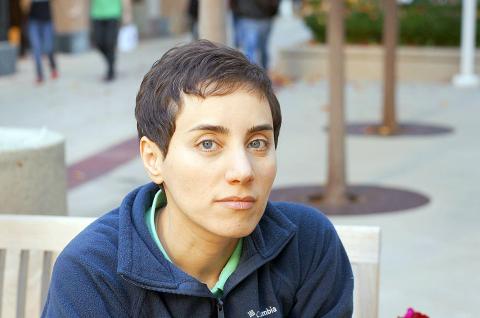Iranian mathematician Maryam Mirzakhani yesterday became the first woman to receive a Fields Medal, often considered mathematics’ equivalent of the Nobel Prize and given every four years.
Several Fields Medals can be awarded at once and Mirzakhani, a professor at Stanford University in California, was one of four winners honored at the International Congress of Mathematicians in Seoul yesterday.
The other recipients were Artur Avila of Brazil’s National Institute of Pure and Applied Mathematics and France’s National Center for Scientific Research; Manjul Bhargava of Princeton University; and Martin Hairer of the University of Warwick in England.

Photo: EPA
The 52 medalists from previous years have all been men.
“This is a great honor. I will be happy if it encourages young female scientists and mathematicians,” Mirzakhani was quoted as saying in a Stanford news release. “I am sure there will be many more women winning this kind of award in coming years.”
Much of the research by Mirzakhani, who was born in Tehran in 1977, involves the behavior of dynamical systems, many of which have no exact mathematical solutions, even simple ones.
“What Maryam discovered is that in another regime, the dynamical orbits are tightly constrained to follow algebraic laws,” said Curtis McMullen, a Harvard University professor who was Mirzakhani’s doctoral adviser. “These dynamical systems describe surfaces with many handles, like pretzels, whose shape is evolving over time by twisting and stretching in a precise way. They are related to billiards on tables that are not rectangular, but still polygonal, like the regular octagon.”
In an e-mail Ingrid Daubechies, a professor of mathematics at Duke University in North Carolina and president of the International Mathematical Union said: “I bet the vast majority of the mathematicians in the world will be happy that it will no longer be possible to say that ‘the Fields Medal has always been awarded only to men.’”

FORCED LABOR: A US court listed three Taiwanese and nine firms based in Taiwan in its indictment, with eight of the companies registered at the same address Nine companies registered in Taiwan, as well as three Taiwanese, on Tuesday were named by the US Department of the Treasury’s Office of Foreign Assets Control (OFAC) as Specially Designated Nationals (SDNs) as a result of a US federal court indictment. The indictment unsealed at the federal court in Brooklyn, New York, said that Chen Zhi (陳志), a dual Cambodian-British national, is being indicted for fraud conspiracy, money laundering and overseeing Prince Holding Group’s forced-labor scam camps in Cambodia. At its peak, the company allegedly made US$30 million per day, court documents showed. The US government has seized Chen’s noncustodial wallet, which contains

SUPPLY CHAIN: Taiwan’s advantages in the drone industry include rapid production capacity that is independent of Chinese-made parts, the economic ministry said The Executive Yuan yesterday approved plans to invest NT$44.2 billion (US$1.44 billion) into domestic production of uncrewed aerial vehicles over the next six years, bringing Taiwan’s output value to more than NT$40 billion by 2030 and making the nation Asia’s democratic hub for the drone supply chain. The proposed budget has NT$33.8 billion in new allocations and NT$10.43 billion in existing funds, the Ministry of Economic Affairs said. Under the new development program, the public sector would purchase nearly 100,000 drones, of which 50,898 would be for civil and government use, while 48,750 would be for national defense, it said. The Ministry of

SENATE RECOMMENDATION: The National Defense Authorization Act encourages the US secretary of defense to invite Taiwan’s navy to participate in the exercises in Hawaii The US Senate on Thursday last week passed the National Defense Authorization Act (NDAA) for Fiscal Year 2026, which strongly encourages the US secretary of defense to invite Taiwan’s naval forces to participate in the Rim of the Pacific (RIMPAC) exercise, as well as allocating military aid of US$1 billion for Taiwan. The bill, which authorizes appropriations for the military activities of the US Department of Defense, military construction and other purposes, passed with 77 votes in support and 20 against. While the NDAA authorizes about US$925 billion of defense spending, the Central News Agency yesterday reported that an aide of US

NINE-IN-ONE ELECTIONS: Prosecutors’ offices recorded 115 cases of alleged foreign interference in the presidential election campaign from August 2023 to Dec. 13 last year The National Security Bureau (NSB) yesterday said that it has begun planning early to counter Chinese interference in next year’s nine-in-one elections as its intelligence shows that Beijing might intensify its tactics, while warning of continued efforts to infiltrate the government and military. The bureau submitted a report to the Legislative Yuan ahead of a meeting today of the Foreign Affairs and National Defense Committee. “We will research situations in different localities and keep track of abnormalities to ensure that next year’s elections proceed without disruption,” the bureau said. Although the project is generally launched during election years, reports of alleged Chinese interference